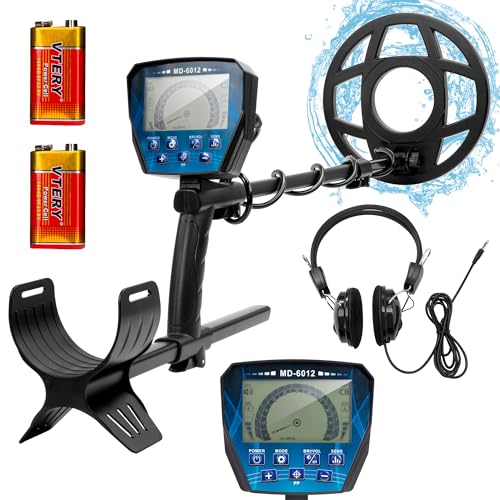
Are you new to the exciting world of metal detecting? Have you been making mistakes without even realizing it?
In this article, we’ll explore common metal detecting mistakes that many beginners often make. By understanding these errors, you can avoid them and enhance your metal detecting skills.
From joining the hobby for the wrong reasons to not prioritizing the right equipment, we’ll provide valuable tips and insights to help you maximize your metal detecting experience and uncover remarkable treasures.
Key Takeaways
- Join the metal detecting hobby for the right reasons and focus on the enjoyment of the process rather than expecting life-changing finds.
- Invest in a quality metal detector from a reputable brand and prioritize it over expensive accessories.
- Be cautious when buying secondhand metal detectors, and consider purchasing from reputable dealers with warranty and after-sales support.
- Obtain permission to detect on land, whether by seeking permission from landowners or exploring alternative options such as detecting on beaches with permits or joining groups that provide access to land.
Mistakes in Joining the Metal Detecting Hobby
When starting out in the metal detecting hobby, you may often underestimate the importance of proper research and knowledge. Finding the right digging tools and understanding the importance of research and preparation are crucial for success in this hobby.
Many beginners make the mistake of not investing in the right tools, such as a good quality metal detector and digging tools. Researching and understanding the different types of metal detectors available, their features, and their suitability for your specific needs is essential.
Additionally, proper research and preparation involve learning about the different detecting techniques, understanding the laws and regulations regarding metal detecting in your area, and finding suitable locations to detect.
Treating Finding Something as a Bonus Rather Than the Main Goal
As you embark on your metal detecting journey, remember to prioritize the main goal of finding something rather than treating it as a bonus. While it’s true that metal detecting is a fun and enjoyable hobby, it’s important to set realistic expectations and balance your enjoyment with the pursuit of valuable finds.
It can be easy to get caught up in the excitement of each new discovery, but remember that the primary objective is to find items of historical or monetary value. By keeping this in mind, you can avoid becoming too focused on trivial finds and ensure that you’re maximizing your chances of uncovering something truly significant.
Importance of Digging Even the Smallest Whisper of a Signal
Don’t underestimate the importance of digging even the tiniest whisper of a signal; you might be surprised by what you uncover! Proper equipment maintenance is crucial for ensuring that you don’t miss out on potential treasures.
Regularly clean and inspect your metal detector to keep it in top working condition. Replace worn-out parts and keep your batteries charged.
When detecting, it’s essential to know how to identify false signals. Techniques such as removing soil and rechecking the tone of a signal can help determine its authenticity. Remember, the size of a signal doesn’t necessarily indicate its value, so don’t disregard small signals.
Checking the Tone of a Signal by Removing Soil and Rechecking
Digging up the soil and rechecking the tone of a signal is a crucial step in metal detecting. It’s important to understand the significance of signal analysis and the techniques for signal identification.
When you receive a signal, don’t just assume it’s valuable based on the initial sound. Take the time to carefully remove the soil around the target and recheck the tone. This technique allows you to gather more information about the target and make a more accurate assessment.
By removing the soil, you can determine the depth, size, and composition of the target, which can help you decide whether it’s worth digging or not.
So, don’t rush the process. Take the time to properly analyze the signal by removing soil and rechecking the tone to maximize your chances of finding something valuable. Remember, patience and thoroughness are key in the world of metal detecting.
Happy hunting!
Not Relying Solely on the Size of the Signal to Determine Its Value
When using a metal detector, make sure you don’t solely rely on the size of the signal to determine its value. Signal interpretation is a crucial skill to develop in metal detecting. While a large signal may indicate a valuable find, it isn’t always the case.
Factors such as target depth and the composition of the surrounding soil can affect the size of the signal. Therefore, it’s important to evaluate target depth by considering the strength of the signal at different heights above the ground. A deep target may produce a smaller signal, while a shallow target may produce a larger signal.
Choosing the Right Metal Detector
To find the perfect metal detector, you should consider your specific needs and research different options available.
When choosing the right metal detector, two important factors to consider are brand reputation and budget considerations.
Investing in a quality brand detector will ensure that you’re getting a reliable and durable machine that will last you for years to come. Brands with a good reputation have a track record of producing high-quality detectors that perform well in various conditions.
Additionally, it’s important to set a budget before making a purchase. Determine how much you’re willing to spend on a metal detector and stick to that budget. Keep in mind that while there are detectors available at different price points, it’s important to find a balance between affordability and quality.
Avoiding Buying a Secondhand Detector Without Warranty
If you want to ensure peace of mind and protect your investment, make sure to avoid buying a secondhand detector without a warranty. Buying from reputable dealers and seeking advice from experienced detectorists are crucial steps to take when purchasing a secondhand detector. Here’s why:
- Buying from reputable dealers: Reputable dealers have a reputation to uphold and are more likely to sell reliable and high-quality detectors. They often offer warranties on their products, giving you the assurance that any potential issues will be taken care of.
- Seeking advice from experienced detectorists: Experienced detectorists have valuable insights and knowledge about different detector models and brands. They can provide guidance on which secondhand detectors are worth considering and which ones to avoid.
Not Prioritizing Expensive Accessories Over a Good Detector
Don’t make the mistake of prioritizing expensive accessories over a good detector.
When it comes to metal detecting, beginners often fall into the trap of thinking that expensive accessories will automatically lead to better finds. While accessories can enhance your experience, they shouldn’t be the main focus.
Investing in a high-quality detector should be your top priority. A good detector will have advanced features and settings that can greatly improve your chances of finding valuable items. It will also be more durable and reliable, ensuring that you won’t have to constantly replace or repair it.
Expensive accessories may seem appealing, but they won’t make up for a subpar detector. So, before splurging on accessories, make sure you have a solid foundation with a good detector.
Considering the Importance of Warranty and After-Sales Support
When purchasing a metal detector, make sure you consider the importance of warranty and after-sales support, as they can greatly impact your overall experience. Here are three reasons why warranty coverage and customer service support are crucial:
- Peace of Mind: A metal detector is an investment, and having warranty coverage ensures that you’re protected against any manufacturing defects or malfunctions. It provides peace of mind knowing that if anything goes wrong, you can get it repaired or replaced without additional cost.
- Timely Assistance: With a reliable after-sales support team, you can receive prompt assistance whenever you encounter any issues or have questions about your metal detector. They can provide troubleshooting tips, guidance on settings, and help you make the most out of your detecting experience.
- Long-Term Reliability: Good customer service support indicates that the manufacturer stands behind their product. They’re committed to ensuring your satisfaction and will assist you throughout the lifespan of your metal detector. This support can make a significant difference in the longevity and reliability of your detector.
Considering warranty coverage and customer service support when buying a metal detector is essential for a worry-free and enjoyable detecting journey.
Researching and Selecting the Right Machine for Your Needs
To find the best metal detector for your needs, research different models and select the one that suits you best. Start by considering your budget and skill level. It’s important to find a detector that fits within your budget while still meeting your requirements.
Researching the different types of metal detectors available is also crucial. There are various types, such as VLF (Very Low Frequency) and PI (Pulse Induction), each with their own strengths and weaknesses. Consider what types of objects you plan to search for and in what environments.
Look for detectors that have features such as discrimination settings, depth capabilities, and target ID displays. Read reviews, watch videos, and seek advice from experienced detectorists to gather as much information as possible.
Frequently Asked Questions
How Can I Find and Obtain Permission From Landowners to Metal Detect on Their Land?
To find and obtain permission from landowners to metal detect on their land, start by researching and joining metal detecting clubs. These clubs often have established relationships with landowners and can provide guidance on obtaining permission.
When approaching landowners, be respectful and explain the hobby’s benefits, such as helping to preserve history. Offer to share any interesting finds and assure them you’ll leave the area as you found it.
Building trust and maintaining good relationships with landowners is crucial for gaining permission to detect on their land.
Are There Any Alternatives to Obtaining Permission From Landowners, Such as Detecting on Beaches With Permits?
Yes, there are alternatives to obtaining permission from landowners for metal detecting.
One option is beach metal detecting with permits. Before heading to the beach, it’s important to research and understand the metal detecting laws in your area. Some beaches may require permits, so be sure to check with local authorities.
Beaches are often popular spots for metal detecting enthusiasts, as they can yield interesting finds. Just remember to follow any regulations and respect the environment while enjoying this alternative detecting experience.
Where Can I Buy a Metal Detector Without the Risk of Buying a Secondhand Detector Without Warranty?
To buy a metal detector without the risk of getting a secondhand one without warranty, you should consider buying new detectors from reputable retailers. Buying new ensures you have a warranty, giving you peace of mind. Reputable retailers will provide reliable customer service and support if any issues arise. Look for quality metal detector brands like Garrett, Minelab, and Fisher. So, do your research, find a trusted retailer, and invest in a new metal detector for a worry-free detecting experience.
How Do I Know if the Warranty on a Metal Detector Is Transferable Without a Receipt?
To know if a metal detector’s warranty is transferable without a receipt, you should contact the manufacturer or check their website. They’ll provide information on warranty terms and conditions. Some companies allow transferring warranties without a receipt, while others may require proof of purchase.
It’s important to understand the warranty validity and transferability before making a purchase. Remember to keep any receipts or documentation to ensure smooth warranty claims and potential transfers in the future.
Are There Any Resources or Groups I Can Join to Learn From Experienced Detectorists and Avoid Quitting the Hobby Prematurely?
There are plenty of resources and groups you can join to learn from experienced detectorists and avoid quitting the hobby prematurely.
One option is to join metal detecting clubs, where you can meet and learn from others who share your passion.
Another option is to participate in online forums and communities dedicated to metal detecting. These platforms provide a wealth of knowledge and advice from experienced detectorists.
Final Thoughts
By avoiding common metal detecting mistakes and following the guidance provided in this article, you can enhance your skills and increase your chances of finding remarkable treasures.
Remember to join the hobby for the right reasons, prioritize digging even the smallest signals, and consider the tone of a signal to determine its value.
Choosing the right metal detector, investing in a quality brand, and seeking advice from experienced detectorists will also contribute to your success.
Happy hunting!














